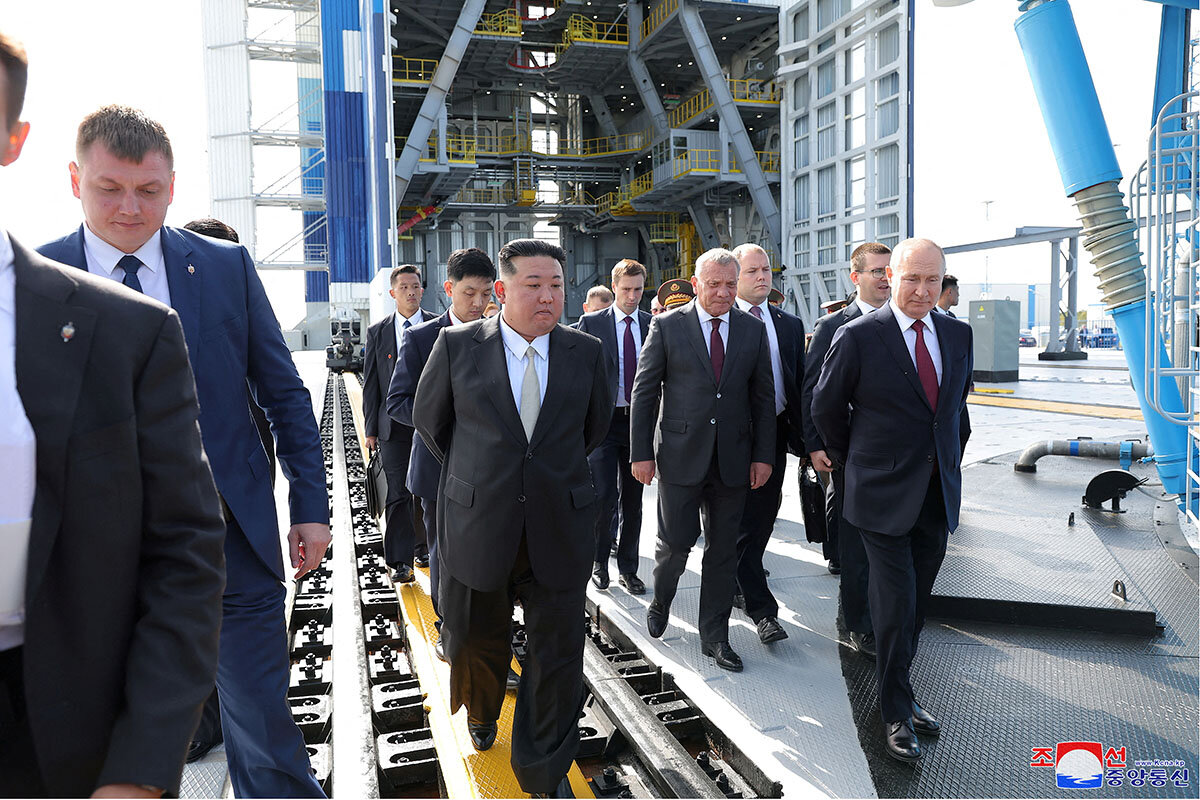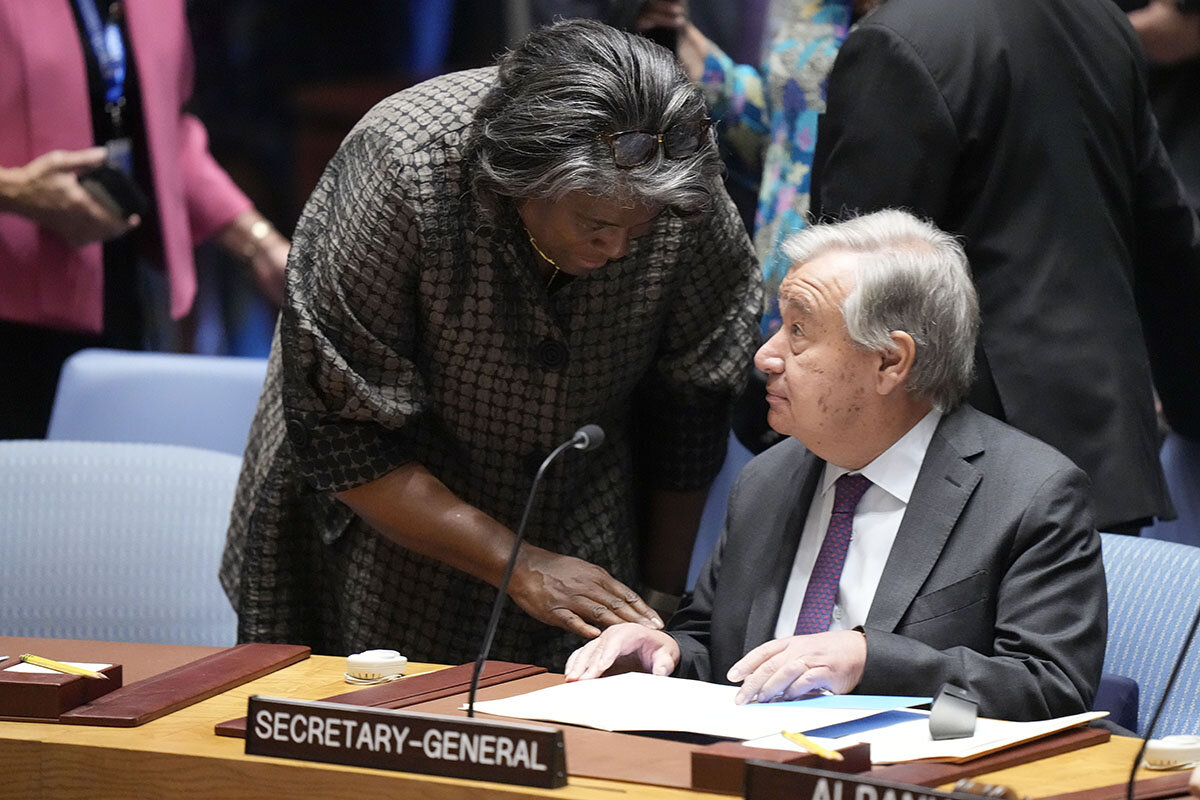UN opens new session. Where are world leaders?
Loading...
| London
As the United Nations General Assembly opened this week in New York for the 78th time, there was plenty going on in the world that called for the sort of global response that the U.N. specializes in.
Climate change, an economic and debt crisis in the developing world, tension between the United States and China. Europe’s largest armed conflict since the end of the Second World War.
Why We Wrote This
A story focused onJoe Biden was the only leader of a United Nations Security Council member to attend this week’s U.N. General Assembly. Can the international body retain its relevance in a rapidly changing world?
But U.S. President Joe Biden was the only leader of a U.N. Security Council member nation to show up. Just when cooperation seems most needed, many world leaders have been turning away from the internationalism that the U.N. embodies.
Instead, they are focusing their attention on smaller economic, political, or security partnerships they view as less unwieldy – and more directly aligned with their own interests.
U.N. Secretary-General António Guterres is fighting to keep the world body relevant; in his speech this week, he focused on climate change and poverty in the Global South as two key challenges where the U.N. can harness energy and resources.
The United Nations is not about to disappear. But Mr. Guterres is aware that for the kind of coordinated international action the U.N. hopes to galvanize, he needs full-throated buy-in from all its member states.
And that has by no means been forthcoming.
You might call it the Paradox of Turtle Bay.
And how it’s resolved could go a long way to defining the future of the increasingly fragile international order put in place in the aftermath of World War II.
This week’s 78th gathering of the United Nations General Assembly – at U.N. headquarters in New York’s Turtle Bay neighborhood, on the East River – comes at a time when an array of challenges seems to demand exactly the kind of worldwide response for which the U.N. was created.
Why We Wrote This
A story focused onJoe Biden was the only leader of a United Nations Security Council member to attend this week’s U.N. General Assembly. Can the international body retain its relevance in a rapidly changing world?
The list is daunting: climate change, an economic and debt crisis in the developing world, tension between the United States and China. And Europe’s largest armed conflict since the end of the world war, provoked by Russia’s invasion of Ukraine.
The paradox? Just when cooperation seems most needed, many world leaders have been turning away from the internationalism that the U.N. embodies.
They are focusing their attention on smaller economic, political, or security partnerships they view as less unwieldy – and more directly aligned with their own interests.
That was dramatically illustrated by the who’s who of leaders who did not come to New York this week.
U.S. President Joe Biden was the only leader of a permanent Security Council member nation to attend. The other four nations – China, Russia, Britain, and France – sent government ministers instead. So did India, the world’s most populous country and fastest-growing major economy.
Their diplomatic focus, of late, has been elsewhere.
For China, it has been on the expanding BRICS economic alliance, which also includes Brazil, Russia, India, and South Africa. Leader Xi Jinping envisions it as part of an alternative to the post-World War II order largely crafted by the U.S.
Russia’s focus has been closer to home, on its core Ukraine-war allies: China, Belarus, and the latest, North Korea.
Leaders of Britain and France, despite sharing Mr. Biden’s hope for a reinvigorated, more effective U.N., have increasingly prioritized other forums since the Ukraine war, such as NATO, the G7 group of the world’s leading economies, and the wider G20 economic grouping.
And Indian Prime Minister Narendra Modi’s recent priority has been to assert his country’s leading role within the so-called Global South.
This week’s U.N. diplomacy showcased one of the world body’s unique strengths – gathering representatives from every nation on Earth to highlight issues on which joint action is urgently needed. But it came amid growing pressure on the institution to adapt to a changing world, in two ways above all: to give a greater voice to the Global South, poorer and middle-income nations in Africa, Asia, and Latin America, and to free the U.N.’s top decision-making body, the Security Council, from the stalemating veto power of its five permanent members.
U.N. Secretary-General António Guterres has delivered a powerful twin message this week: Reinvigorated worldwide action is essential on climate change, economic development, and the Ukraine war – and the U.N. itself must adapt to a world that looks nothing like it did 80 years ago.
President Biden, addressing the general assembly, echoed both themes.
So did Ukrainian President Volodymyr Zelenskyy, with particular force, in the Security Council. As Russia’s U.N. ambassador looked on, he decried the “veto power in the hands of the aggressor,” adding that “Ukrainian soldiers are now doing with their blood what the U.N. Security Council should do with their votes.”
Yet it’s not just problems in the Security Council that are limiting the U.N.’s influence and effectiveness. It’s the competing attraction, for many nations, of other, narrower partnerships.
The United Nations is not about to disappear.
It still plays a uniquely important role on a range of issues – providing humanitarian assistance, peacekeeping, conducting nuclear inspection, and upholding international law. It is the only forum for all the world’s nations, bound by a shared charter of principles and human rights, and with the power to lend an international imprimatur to the use of armed force.
Mr. Guterres this week underscored two urgent policy challenges.
The first was climate change, for which he called to hold accountable the G20 states, China and the U.S. included, which are responsible for four-fifths of the world’s carbon emissions.
The second was the huge pressures on countries in the Global South, as the U.N.’s wealthier members lag badly on the 2030 sustainable development goals they agreed to in 2015.
On most of the goals – eradicating extreme poverty, ensuring secondary school education, ending gender inequalities, and improving environmental policies – things are far behind schedule. Some African states spend more on debt interest than on public health.
The U.N. chief has sought to enlist help from potentially competing diplomatic forums: the G7, for more debt relief to the world’s less developed nations, and the G20, to put more money towards funding the development goals.
But he is aware that for the kind of coordinated international action that the U.N. hopes to galvanize, he needs full-throated buy-in from all its member states.
And that has by no means been forthcoming.










